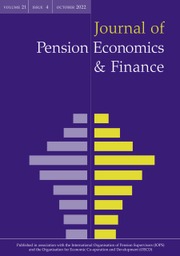Article contents
Public pension wealth and household asset holdings: new evidence from Belgium
Published online by Cambridge University Press: 22 January 2019
Abstract
It has been long suggested that public pension wealth may crowd out household savings. However, there remains controversy about the extent of this displacement effect. In this paper we use an original microsimulation model based on retrospective survey data collected through the third wave of the Survey of Health, Ageing and Retirement in Europe (SHARE) to estimate the displacement effect of public pension wealth on other wealth in Belgium. Combining this rich dataset with an accurate estimation of the individual pension entitlements allows us to circumvent some of the main measurement error problems faced by previous studies. We estimate that an extra euro of public pension wealth is associated with about 14–25 cent decline in households’ non-pension wealth.
- Type
- Article
- Information
- Copyright
- Copyright © Cambridge University Press 2019
References
- 8
- Cited by


